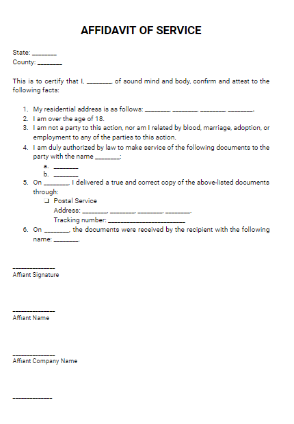- Eviction Notice Forms
- Power of Attorney Forms Forms
- Bill of Sale (Purchase Agreement) Forms
- Lease Agreement Forms
- Rental Application Forms
- Living Will Forms Forms
- Recommendation Letters Forms
- Resignation Letters Forms
- Release of Liability Agreement Forms
- Promissory Note Forms
- LLC Operating Agreement Forms
- Deed of Sale Forms
- Consent Form Forms
- Support Affidavit Forms
- Paternity Affidavit Forms
- Marital Affidavit Forms
- Financial Affidavit Forms
- Residential Affidavit Forms
- Affidavit of Identity Forms
- Affidavit of Title Forms
- Employment Affidavit Forms
- Affidavit of Loss Forms
- Gift Affidavit Forms
- Small Estate Affidavit Forms
- Service Affidavit Forms
- Heirship Affidavit Forms
- Survivorship Affidavit Forms
- Desistance Affidavit Forms
- Discrepancy Affidavit Forms
- Guardianship Affidavit Forms
- Undertaking Affidavit Forms
- General Affidavit Forms
- Affidavit of Death Forms
Service Affidavit
If you’re involved in a court proceeding, whether it’s for a personal or business affair, you’ll likely come across a document known as the Service Affidavit. It’s a piece of legal evidence of the parties you’ve served documents to, proving that such documents have been received. This affidavit can be a crucial part of a proceeding; thus, must be completed in a correct and timely manner. Read More

What Is A Service Affidavit?
A Service Affidavit, also known as a Proof of Service or Return of Service Affidavit, is a type of affidavit used to prove the receipt of a legal document from another party, as required in state and federal courts. This affidavit is often used in lawsuits and other court proceedings as proof that the document had been delivered successfully. The affidavit is provided by an individual known as the process server, who is responsible for filing the affidavit in court. Failure to carry out this task correctly may potentially challenge, suspend, postpone, or dismiss the proceeding due to the process server’s incompetence. Similarly, forging the affidavit for whatever reason is a criminal offense that will not only challenge the case but also subject the process server to a civil suit.
Five Tips on How to Create a Service Affidavit
Anyone can make an affidavit without hiring a lawyer, provided that you are able to complete, sign, and notarize the affidavit according to its legal requirements. The affidavit must also contain sufficient details that the court requested for or may find useful to a proceeding. Listed below are some of the points you’ll want to remember when drafting your Service Affidavit.
Title and Caption the Affidavit
The first thing you want to do is to title the affidavit. A caption should follow specifying the court name and location where the action is filed, including a case reference that covers the case number and names of the parties involved. As the initial part of your document, you need to make sure that this information is accurate, so make sure you pay close attention to every detail.
Identify the Recipient and Server
For the affidavit to be valid, the name of the person who receives the document must be provided. A short description of the recipient, such as their age and address, may also be helpful for proper identification. Similarly, the full legal name and address of the process server, or the person performing the service, must be stated clearly in the affidavit.
Describe the Document(s) Served
This section of the Service Affidavit can be short and simple. It should detail the type of document served to the recipient to properly identify what was involved in the exchange. In many scenarios, you can list more than one document.
Include the Facts
Another essential part of a Service Affidavit is the section that states the date of when the documents were delivered and the place or address where the service occurred. Make sure you have this information verified to avoid discrepancies with any supplemental documents.
Get It Notarized
In most cases, notarized affidavits are a must. Make sure to sign the affidavit in the presence of a notary public or any other authorized official for authentication. Ensure that all details in the document are complete and correct before submission. When done, you, as the process server, can file the Service Affidavit in court.
FAQs
When is a service affidavit needed?
Whenever the court requires a form of valid evidence to prove the delivery of legal documents to another party, a Service Affidavit is required to prove that the exchange between the concerned parties had occurred. Common instances where a Service Affidavit is required include the delivery of summons, complaints, cross-complaints, divorce papers, motions, foreclosure notifications, and orders. And even if it isn’t mandatory, the affidavit can still serve as formal documentation and proof of delivery.
How long do I have to file a service affidavit?
It’s important to file and complete the affidavit at least five days prior to the scheduled court date. Even if you have the document prepared in time, but the affidavit remains incomplete or fails to cover the necessary details, it may not hold up in court.
Who can sign a service affidavit?
The person or entity authorized to sign a proof of delivery would depend on the type of Affidavit of Service in question. Personal service cases, for instance, require the signature of the assigned process server, who can be a law enforcement officer or a private process server. As for affidavits of service in publication cases, an employee or authorized representative from the publication may be in charge.
What are the consequences of not having a service affidavit?
If you fail to prove that a legal document was sent to an opposing party, or if that affidavit is incomplete and therefore unlawful, then you may face the consequences that could not only threaten and denounce the proceeding but also subject you to severe legal and financial penalties. The worst that could happen is for you, as the process server, to serve jail time for something that could’ve been avoided by following the right procedures.
How do I prove that I was never served the required legal document?
If you’re the person intended to receive the legal document—be it divorce papers, summons, or court orders—but somehow obtained a default judgement despite never being served the document, you can review the pleadings together with a litigation attorney to prove that you were not present to claim the service. It’s also best to check the details provided in the affidavit, as any false information that may be countered will likely work in your favor.
Note that there are laws and court rules that dictate how service must be made and what form of documentation may be used to verify proper service. Understanding the laws that apply to your case is important. If you are unsure about the legalities of your case and the best way to approach it, it’s always a good idea to seek legal advice from a licensed professional for clarity.
